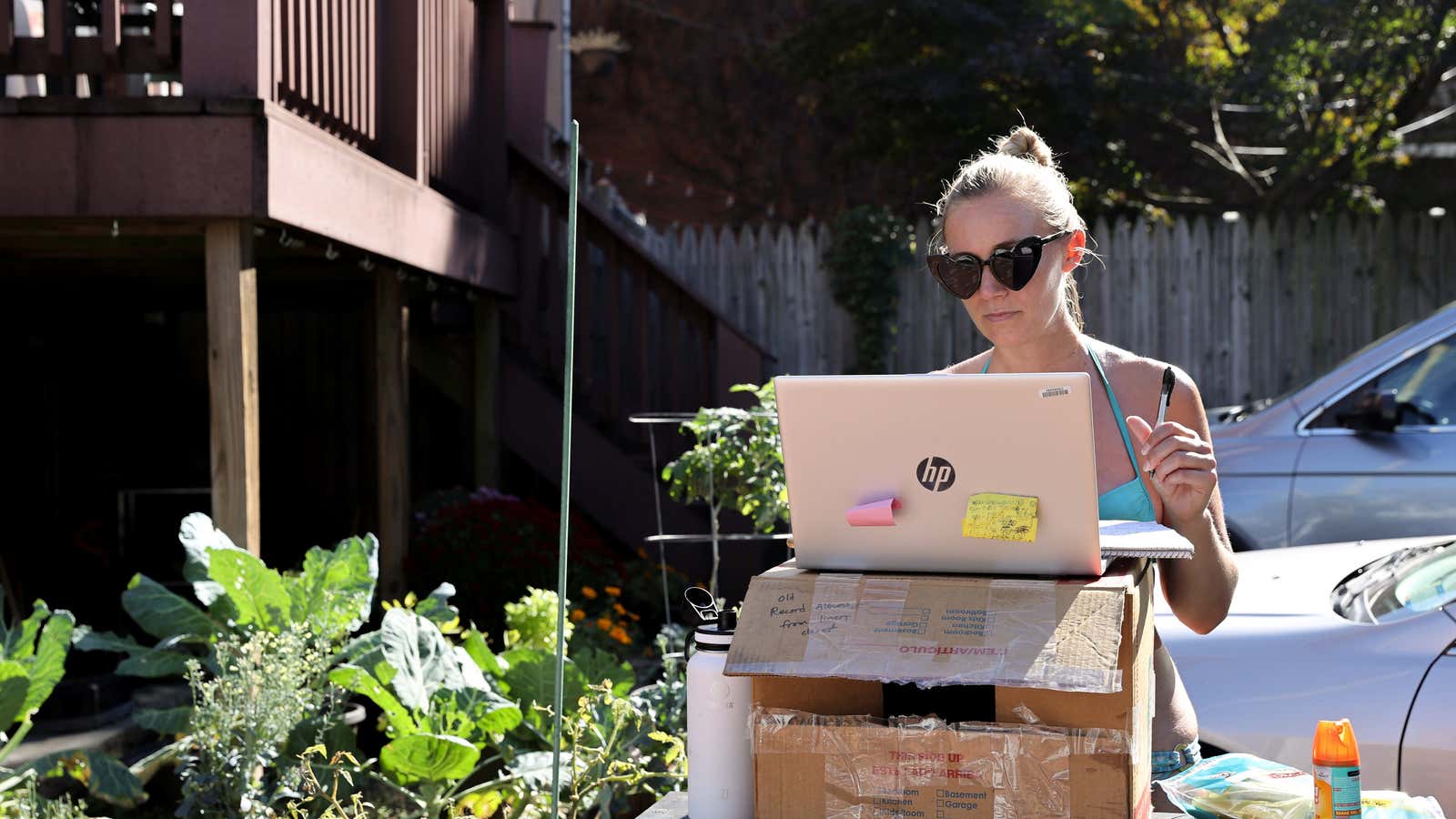Working from home in your Zoom tops and pajama bottoms may be safe and cozy, but it’s also a privilege that’s not available to everyone and has economic implications beyond one’s personal pocketbook.
With millions of white collar professionals having gone remote this year, retail, food, and other businesses that rely on buzzing office districts are suffering major losses and bankruptcies, while many of their employees have been left jobless.
Now, Deutsche Bank Research has proposed one way to reduce the impact of this inequity: In a new report (PDF), the bank argues for a work-from-home (WFH) tax on those who choose the remote work lifestyle once the pandemic has ended. If a company closes or repurposes their offices so its employees have no choice but to work from home, tax the employer, they say. The money would be used to create subsidies for a country’s lowest-paid workers, who often have to do their jobs in person.
“For years we have needed a tax on remote workers—Covid has just made it obvious,” Luke Templeton, the strategist who led the research, writes. “Those who can WFH receive direct and indirect financial benefits and they should be taxed in order to smooth the transition process for those who have been suddenly displaced.”
Deutsche’s hypothetical tax—they suggest 5% of one’s salary for every day a person works from home—would not apply to the self-employed or those earning a low income. Neither would it be in effect during government-mandated closures like those we’ve seen during the Covid-19 pandemic. It would only be paid by (or on behalf of) those who don’t plan to return to the office five days per week, or can’t, after the pandemic. The bank’s recent survey suggests that will be more than half of people who are currently working remotely.
For someone earning $55,000 in the US and only going into the office two days per week, they found, a WFH tax would equal just more than $10 per day, equal to what people would normally spend—on things like coffee, transportation, and, presumably, real pants—had they gone into a workplace. But while individuals who work from home only part of the week might not feel burdened by the tax, the payoff could be meaningful, the strategists say. (For those working remotely full-time, the tax would be a much heavier lift). This scheme would raise $49 billion per year in the US, according to the strategists’ calculations (detailed in the report), enough to fund a $1,500 per person grant to 30 million workers who can’t work from home and make less than $30,000 a year, the bank finds.
Applying their formulations to assumed salaries of €40,000 in Germany and £35,000 in the UK, the strategists found the tax would raise €20 billion and £7 billion respectively, annually.
Preemptively responding to criticism of the idea, Templeton adds that non-believers “will say that engagement with the economy is a personal choice and they should not be penalized for making that decision. Yet, these people should remember that governments have always backsolved taxes to suit the social environment.”
He points to the 18th century practice in the UK of taxing households according to the number of windows in a home, an imperfect system that served as a form of income tax when citizens were not yet ready to accept the latter. “In the same way, as our current society moves towards a state of ‘human disconnection’, our tax system must move with it,” he reasons.
But on social media, early critics of the idea have attacked its source. Isn’t this rich coming from Deutsche Bank, they suggest, the recipient of indirect taxpayer bailout after the financial crisis and a company mired in various scandals over the past decade. Some people have complained that rather than shake down workers who are now covering the costs of internet access and other expenses employers normally pay, the government should tax wealthy business owners and billionaires.
Economists who argue people working from home “are contributing less to the infrastructure of the economy whilst still receiving its benefits” also advocate for less corporate regulation, Maja Korica, a management professor at Warwick Business School in the UK, wrote on Twitter, quoting the Deutsche bank report. “We should ignore them 100%.”
Arguably, the other option is to push for both more corporate taxes and a work from home tariff, if people are serious about building a more inclusive economy after the pandemic. Besides, it’s possible that a WFH tax could be temporary. Several urban planners believe the economic activity that has withered in suddenly quiet office districts will eventually spring to life in residential neighborhoods, which might include city centers if offices are converted into or replaced by additional housing.
Although Deutsche Bank’s report doesn’t mention the racial makeup of those who would be paying the tax and those who would benefit from it, the reality in the US is that more white and Asian Americans are able to work from home, compared to Black Americans and Hispanic or Latino workers. That means more already privileged people are currently benefitting from greater safety, higher salaries, and lower costs of living, while others from marginalized groups are putting themselves and their families at risk, earning less for it, and spending more on the daily costs associated with going into a workplace.
If pandemics become more common in the years ahead, people working from home in future will still benefit from all the same protections and financial perks.
A “WFH tax” wouldn’t solve the problems that created this imbalance—one resulting from structural and systemic issues, not individual human choices, as some market watchers who oppose the idea suggest. However, at the very least, it would begin to tackle the problems of a deep economic divide that appears to be intensifying.
